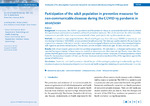Participation of the adult population in preventive measures for non-communicable diseases during the COVID-19 pandemic in 2020/2021
Jordan, Susanne
Kuhnert, Ronny
Schmid-Küpke, Nora Katharina
Starker, Anne
Background: In 2020/2021, the COVID-19 pandemic and the protective measures associated therewith severely limited the opportunity to participate in prevention and health promotion measures. The article examines the utilisation of the measures and possible factors that are associated with a lower participation during these pandemic years.
Methods: It is based on data acquired between March and August 2021 from the study ‘COVID-19 vaccination rate monitoring in Germany’ (COVIMO), a cross-sectional telephone survey. The data was used to examine the participation in preventive measures in the last 12 months in terms of sociodemographic factors and to analyse a decreased participation with regard to pandemic-related factors. The analysis sample includes individuals aged 18 years and over (n=3,998).
Results: 63% of participants generally did not use these programmes, 7% indicated an unchanged participation, 28% reported having participated in fewer measures, and 2% in more measures. Men reported significantly more often than women that they generally do not participate in prevention and health promotion measures. A relevant pandemic-related factor for decreased participation of men was the less clearly perceived comprehensibility of the regulations against the spread of SARS-CoV-2.
Conclusions: Prevention and health promotion should be part of the contingency planning in epidemically significant situations to prevent a decreased participation and to promote health and gender-related equal opportunities even in a crisis.
Dateien zu dieser Publikation

